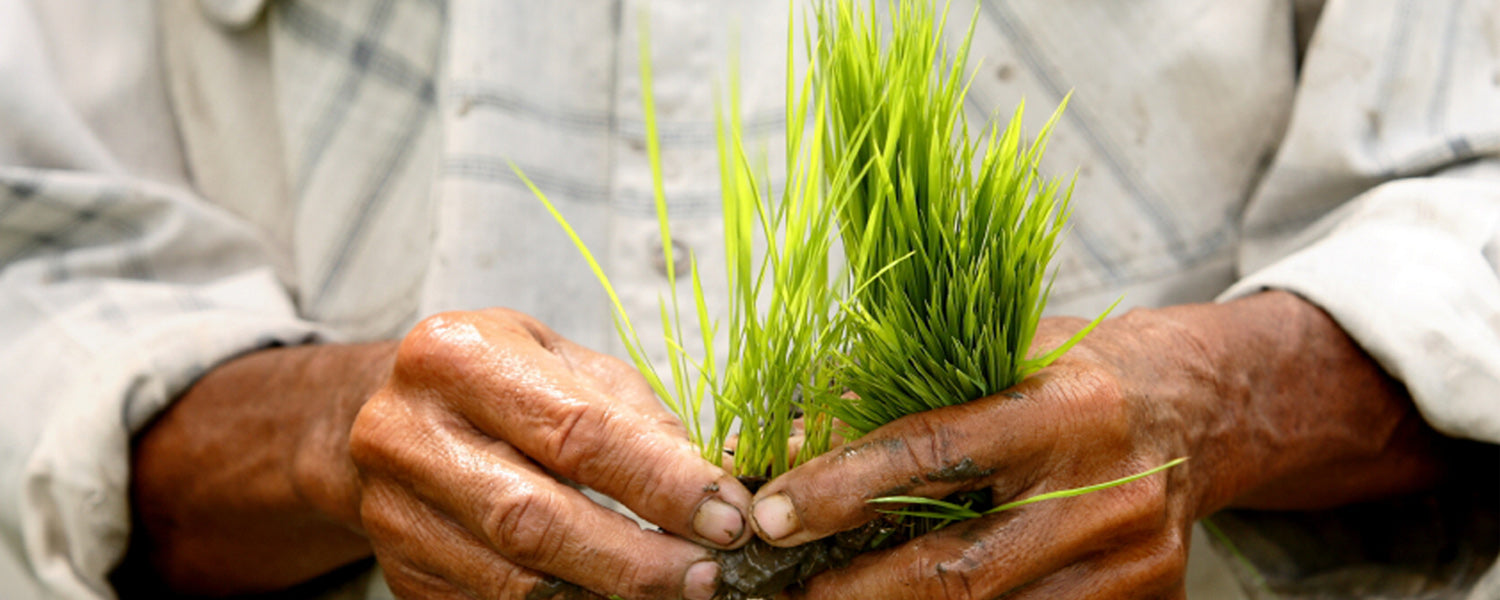SRI - System of Rice Intensification ORI
SRI Principles
The key differences that make SRI organic a far better cultivating practice compared to normal organic, or conventional methods.
| Non-Organic | Normal Organic | Sunria SRI Organic | SRI Impact |
|
| Fertilizer | Chemical | Processed organic | Homemade compost | More presence of naturally grown soil organisms and nutrients |
| Pesticides | Chemical | Processed organic | Homade natural repellent from bitter and pungent plants | More natural way to be chemical free |
| Seedlings | 30-day seedlings | 30-day seedlings | 5-10 days old seelings | More time for root system to develop and thus effectively absorb more nutrients |
| Seed Specing | A few seedlings every 20 x 20cm | A few seedlings every 20 x 20cm | Single seedling every 30 x 30cm | More space for the roots to grow to its maximum size to uptake nutrients |
| Water | Flooding of fields | Flooding of fields | Minimum and moist | Soil organisms can survive, and there is less methane emissions |
SRI Benefits
Conservation of water
 Using the SRI system, because our fields only need to be moist instead of flooded, Sunria rice saves up to 50% of our precious water used during cultivation. This is a significant saving considering that only 1% of the water available on earth is fresh water for us to use.
Using the SRI system, because our fields only need to be moist instead of flooded, Sunria rice saves up to 50% of our precious water used during cultivation. This is a significant saving considering that only 1% of the water available on earth is fresh water for us to use.
Reduction of greenhouse gas emissions
 Flooded paddy fields are one of the world’s biggest producers of methane, the second biggest contributor for global warming. It is responsible for 10% of total emissions and retains 20 times more heat than carbon dioxide. In flooded paddy field, there is an absence of oxygen, and anaerobic condition develops driving bacteria under the soil to release methane into the atmosphere. Because Sunria rice is grown on unfolded field, there is a reduction of methane gas to fight global warming.
Flooded paddy fields are one of the world’s biggest producers of methane, the second biggest contributor for global warming. It is responsible for 10% of total emissions and retains 20 times more heat than carbon dioxide. In flooded paddy field, there is an absence of oxygen, and anaerobic condition develops driving bacteria under the soil to release methane into the atmosphere. Because Sunria rice is grown on unfolded field, there is a reduction of methane gas to fight global warming.
Increased Biodiversity and Fertility
 SRI increases the diversity of the soil organisms. Millions of soil organisms drown in a flooded field. Sunria farmers leaves the field moist, so millions of diverse soil organisms including earthworms, bacteria, algae, fungi and protozoa, work together to make more nutrients available to the soil and increase its fertility.
SRI increases the diversity of the soil organisms. Millions of soil organisms drown in a flooded field. Sunria farmers leaves the field moist, so millions of diverse soil organisms including earthworms, bacteria, algae, fungi and protozoa, work together to make more nutrients available to the soil and increase its fertility.
Increased Productivity
 Using SRI method, which capitalizes on proper management of soil and water, Sunria farmers have increased yield by 78%, giving them a better livelihood while helping us to protect our food supply. With the growing global population and declining arable land, increased land productivity is extremely important.
Using SRI method, which capitalizes on proper management of soil and water, Sunria farmers have increased yield by 78%, giving them a better livelihood while helping us to protect our food supply. With the growing global population and declining arable land, increased land productivity is extremely important.
Quality Nutrition, and Better Taste and Aroma.
 Through SRI practices, the roots of our rice plants are bigger and stronger, and they can absorb more nutrients, produce better signals and hormones regulating plant growth. The result is a healthier plant with quality nutrition, and better taste and aroma!
Through SRI practices, the roots of our rice plants are bigger and stronger, and they can absorb more nutrients, produce better signals and hormones regulating plant growth. The result is a healthier plant with quality nutrition, and better taste and aroma!

